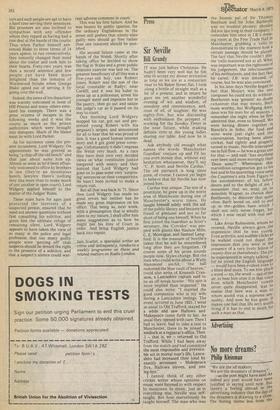Press
Sir Neville
Bill Grundy
IT was just before Christmas. He hadn't been very well but he felt 'able tb accept my dinner invitation as long as we ate at a restaurant near to his Baker Street flat. I took along a bottle of straight malt as a bit of a present, and in return he gave me yet another wonderful evening of wit and wisdom, of anecdote and reminiscence, and, most of all, of laughter. He was eighty-five, but was discussing' with enthusiasm the prospect of
working for the Sunday Times in the near future, while making
definite eyes at the young ladies sharing our table. And now he is dead.
Ask anybody old enough what names the words 'Manchester Guardian' conjure up and I'll lay you even money that, without any hesitation whatsoever, they'll say "C. P. Scott and Neville Cardus." The old patriarch is long since gone, of course. I cannot yet begin to believe that Sir Neville has now joined him.
Cardus was unique. The son of a prostitute, he grew up in the worst area of Manchester during one of Manchester's worst times. He taught himself solely with the aid of the public library and became the friend of geniuses and not so far short of being one himself. When he first joined the Guardian as Scott's secretary, the 'Corridor' was peopled with giants like Haslam Mills, C. E. Montague, and Samuel Lang ford. It is the measure of Neville's talent that he will be remembered long after they are forgotten. Of course some of his prose sounds purple now. Styles change. But the man who could write about a Wally Hammond six-hit, "the ball endomed the blue vault of heaven," could also write of Kenneth Cran ston, a Lancashire captain said to be an off-break bowler: "His spin is more implied than imparted." He could also write: "I married the good companion who is my wife during a Lancashire innings. The event occured in June 1921; I went as usual to Old Trafford, stayed for a while and saw Hallows and Makepeace come forth to bat. As usual they opened with care. Then I had to leave, had to take a taxi to Manchester, there to be joined in wedlock at a registrar's office. Then I — that is, we — returned to Old Trafford. While I had been away from the match and had committed the most responsible and irrevocable act in mortal mans life, Lancashire had increased their total by exactly seventeen Makepeace five, Hallows eleven, and one leg-bye."
I cannot think of any other cricket writer whose opinions on music were listened to with respect by musicians. In music, just as in everything else, Neville was selftaught. But how marvellously he ,taught himself. The man who was the bosom pal of Sir Thomas Beecham and Sir John Barbirolli was no musical phoney; phonies aid not last long in their company. I
remember him once in J.B.'s dressing room at the Free Trade Hall in
Manchester, grabbing a 'cello to demonstrate to the maestro how a certain passage should be played. The fact that Neville couldn't play the 'cello mattered not at all. What was important was the rightness of his judgement, the infectiousness of his enthusiasm, and the fact that he cared. J.B. was amused, of course, but he was also convinced.
In his later days Neville began to feel that Mozart was the one composer he could not do without. Beethoven was 'greater' no doubt (whatever that may mean), Bach more worthy, but Wolfgang Ama deus was his man for all seasons. I remember the night when he first admitted that, even to himself. We were having dinner together in Bianchi's in Soho, the food and wine were just right and the conversation, having been about cricket, had rightly and properlY turned to music. Neville interupted me in full flow — he was a great one for that — and said "has anything ever been said more movingly than 'Dove sono'?" Whereupon this marvellous octogenarian got to his feet and in his quavering voice sang the Countess's aria from Figaro to the astonishment of his fellow diners and to the delight of me. I remember that we went on to demolish Wagner, to cherish dear Beethoven, to discover that quite often Bach bored us, and to end up in the golden haze which I shall not only never forget, but which I now recall with real sadness.
Like Artur Rubinstein, whom be revered, Neville always gave the impression that he was young. Even arthritis, and audible clicks as he walked could not dispel the impression that you were in the presence of a very lively fellow of twenty-five or thereabouts. The joY he experienced in simply talking — for he loved the English language — would have been evident even to a blind deaf mute. To see him pluck a word — no, the word — out of the air, to hear him utter it in that voice from which Manchester vowels never quite disappeared, was to realise that here was a man t° whom sound was a supreme sensuality. And now he has gone. It makes one feel that life isn't worth living if it has to end in death for such a man as that.










































 Previous page
Previous page